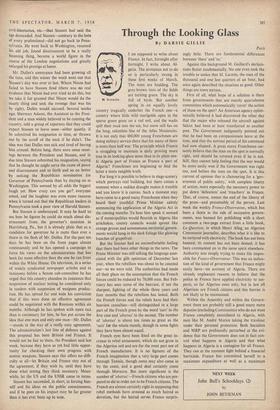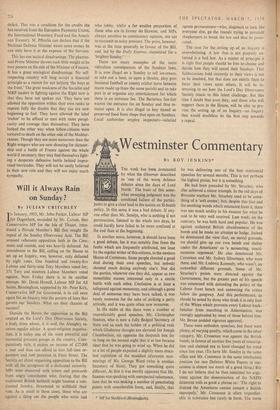Through the Looking Glass
By DARSIE GILLIE I AM supposed to write about France. In fact, fortnight after fortnight, I write about Al- geria. The invitation not to do so is particularly strong in these first weeks of March. The trees are budding. The grey-brown tints of the fields are turning green. The sky is M. Bourgulba full of birds. But another spring in an equally lovely country tragically underlies the French one—a country where little wild marigolds open in the sparse green grass on a red soil, and the wadis spill their mud into the -sea, but snow still lies on the long, relentless line of the Atlas Mountains. It is not only that 400,000 young Frenchmen are doing military service there that for many of them is more than half war. The principle which France is struggling to maintain is daily proving more true in its looking-glass sense than in its plain one. Is Algeria part of France or France a part of Algeria? Frenchmen are beginning to find the latter a more tangible truth.
For long it is possible to believe in stage-scenery which portrays real building, but there comes a moment when a sudden draught makes it tremble and you know it is canvas. Such a moment may have come to a good many Frenchmen when they heard their youthful Prime Minister calmly announcing the application of the Algeria Act in the coming months. To hear him speak it seemed as if municipalities would flourish in Algeria like artichokes, county councils would sprout like orange groves and autonomous territorial govern- ments would hang in the dark foliage like glowing bunches of •grapefruit.
But the listener had an uncomfortable feeling that there had been other things in the news. The Prime Minister was still talking the language asso- ciated with the glib optimism of December last year, when the rebellion was about to be counted out—so we were told. The authorities had made all their plans on, the assumption that the French forces could be reduced by 70,000 men. But Feb- ruary has seen some of the heaviest, if not the sharpest, fighting of the whole three years and four months that the rebellion has lasted. Both the French forces and the rebels have had their heaviest casualties—still distinguished in a large part of the French press by the word `tues' in the first case and 'abattus' in the second. The number of 'abattus' is about ten times as great as the 'rues' for the whole month, though in some fights they have been almost equal.
French eyes have been fixed on the great in- crease in rebel armaments, which do not grow in the Algerian soil and are for the most part not of French manufacture. It is no figment of the French imagination that a very large part comes through Tunisia, though some may also come in by the coast, and a good deal certainly come through Morocco. But more significant is the number of 'abattus'—French citizens who are pre- pared to die in order not to be French citizens. The French are almost certainly right in supposing that rebel methods have aroused as much hatred as devotion, but the hatred serves France surpris- Paris ingly little. There are fundamental differences between `them' and 'us.'
Against this background M. Gaillard's declara- tions flutter insubstantially. No one even took the trouble to notice that M. Lacoste, the man of the thousand and one last quarters of an hour, had once again described the situation as good. Other things are more serious.
First of all, what hope of a solution is there from governments that are merely quarrelsome committees which automatically 'cover' the action of those on the spot? An American agency optim- istically believed it had discovered the other day that the major who released the aircraft against Sakiet had been at least transferred to another post. The Government indignantly pointed out that he had been on compassionate leave at the time, and-that the normal period of his command had now elapsed. A great many Frenchmen cer- tainly believe that the man on the spot is normally right, and should be covered even if he is not. Still, they cannot help feeling that the war would be more easily won if the Government was right too, and before the man on the spot. It is this current of opinion that is clamouring for a 'gov- ernment of public safety,' with complete liberty of action, more especially the necessary power to put down 'defeatism' and 'treachery' in France. That, of course, means the end of the liberty of the press—and presumably of the person. Last week the weekly Prance-Observateur, which has been a thorn in the side of successive govern- ments, was banned for publishing with a short comment a, two-page extract from a little book, La Question, in which Henri Alleg, an Algerian Communist journalist, describes what it is like to be tortured with electricity. The book has not been banned; its content has not been denied; it has been commented on in the same spirit elsewhere. Authority was simply trying to make life impos- sible for France-Observateur. This was an indica- tion of the kind of government that France might easily have—on account of Algeria. There are already unpleasant reasons to believe that the police in France have applied electricity to sus- pects, so far Algerian ones only, but in law all Algerians are French citizens and this barrier is not likely to be maintained.
Within the Assembly and within the Govern- ment there are probably still a good many more deputies (excluding Communists) who do not want France completely assimilated to Algeria, with men like M. Andrd Morice taking the tricolour under their personal protection. Both Socialists and MRP are profoundly perturbed at the evi- dence that the Government does not in fact con- trol what happens in Algeria and that what happens in Algeria is a contagion for all France. They can at the moment fight behind a financial barricade. France has committed herself to a maximum expenditure as well as a maximum deficit. This was a condition for the credits she has received from the European Payments Union, the International Monetary Fund and the Ameri- can Treasury. M. Pflimlin can declare that if the National Defence Minister wants more money he can only have it at the expense of the Services.
This has one tactical disadvantage. The phantas- mal Prime Minister throws such little weight as he may possess on the side of the Minister of Finance. It has a great strategical disadvantage. No self- respecting country will long accept a financial principle as a reason for not helping 'the boys at the front.' The great weakness of the Socialist and MRP leaders in fighting against the Right now is that they have not spoken out. They have not allowed the opposition within their own ranks to express fully the doubts that they too are now beginning to feel. They have allowed the label `traitor' to be affixed to men with more perspi- cacity and courage than themselves. They have looked the other way when fellow-citizens were tortured to death on the other side of the Mediter- ranean. Though they are more numerous than the Right-wingers who are now shouting for dictator- ship and a battle of France against the whole world if necessary, they may find themselves fight- ing a desperate defensive battle behind impro- vised barricades. They will not be easily believed in their new role and they will not enjoy much sympathy.



































 Previous page
Previous page